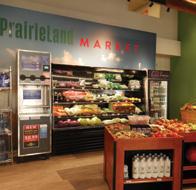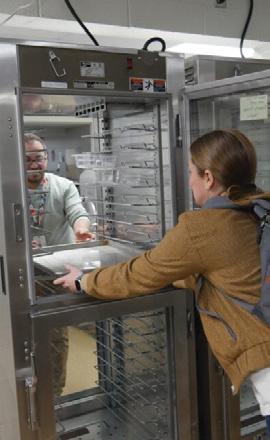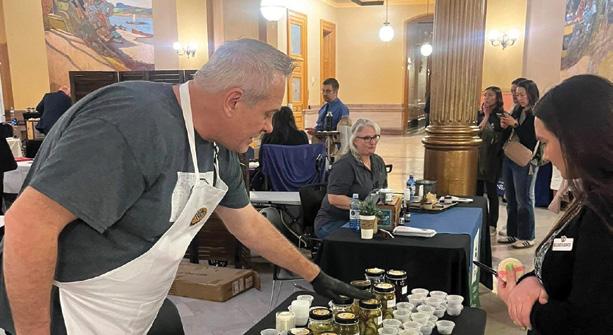

FOOD KANSAS FIRST
Celebrating Kansans’ success stories,
one food-based business at a time.

Welcome to
Kansas Food First

Welcome to Kansas Food First Magazine! We’re thrilled to celebrate the vibrant food community in Kansas and lift up inspiring projects and initiatives.
Each issue of this magazine highlights the hardworking Kansas farmers and food producers that are making a difference in our food system.
In this edition, we’re excited to introduce our K-State Research and Extension’s Local Food Systems program and hear from Amanda Lindahl, Local Food System program Coordinator, about their Food Fellows Program.
You’ll also discover how the Lawrence Public School District is bringing freshbaked bread to 10,000 Pre-K through 12th grade students, and how Los Catrachos is expanding their Latin grocery store to better serve the Liberal, KS community. Plus, explore a showcase of local food highlights with the Taste of Kansas, featuring restaurants, farmers’ markets, grocery stores, and more that make our Kansas food system a dynamic place to live and eat.
We’re so glad you’re here—let’s dig in!

Rebecca McMahon, a longtime K-State Research and Extension employee based in Wichita, provides leadership to the Local Food Systems team. She offers expertise in specialty crop production and community food systems development and serves as a resource connector for the state. In recent years she has led efforts for updating the Kansas Garden Guide to support Kansas fruit and vegetable growers. Rebecca is currently seeking her master’s degree in Agricultural Communications.

Amanda Lindahl holds two degrees in food systems from Kansas State University including Bakery Science and Horticulture. It’s safe to say she is passionate about where our food comes from and supporting local producers, processors, and retailers to supply Kansas with the freshest and most nutritious food available. She has spent a lot of time in community gardens and orchards, primarily in the Kansas City area, as well as on her family farm in Dickinson County. She will be joining the Chisolm Trail District in extension as the new Family Community Wellness Agent in fall 2025.
K-State Research and Extension’s statewide
Food Fellows Program
Amanda Lindahl, Local Food Systems Program Coordinator
The Kansas Local Food Fellows Program was established in late 2023 as a result of the Regional Food Systems Partnership Grant with the purpose of strengthening and growing the capacity of Kansas’ local and regional food systems. The Fellows program facilitates access to resources for our partners through the sponsorship of short-term, 320-hour fellow positions.
In 2024, 16 local food fellows projects were completed across the state of Kansas. They were hosted by a wide variety of community partners, including some K-State Research and Extension local units, county food and farm councils, local business owners, and farmers’ markets. The Fellows projects were selected based on the host sites’ ability to convey their needs for building capacity for local food systems in their communities.
Several common themes were explored among 2024 partners’ projects across the state, as seen in the following Fellows Project Highlights.

Riley County Food Fellow Ellie Bellerive filming videos about shopping, storing and eating produce.
Fellow Project Highlights
Local Food Directories
These organizations completed food fellow projects related to local food directories.
▷ Fort Hays State University conducted a community survey and outreach to connect with local food producers. They compiled a list of local vendors and provided connections for these producers with other key community resources and networks.Sourdough Starters: Care, Safety and Preservation

▷ Reno County connected with local producers and vendors to compile contact information and producer stories in a county directory.
▷ Healthy Bourbon County Action Team worked with local producers to highlight businesses through unique storytelling shared in their county directory and on their social media.
▷ Kansas Black Farmers Association connected with their member growers and compiled an internal directory of members.
Farmers’ Market Outreach
There were six different fellows that were involved in farmers market outreach and engagement across Kansas. In Manhattan, Newton, Iola, Lawrence, and Liberal, fellows completed various outreach strategies to engage SNAP and Double Up Food Bucks customers.

Dedicated outreach and promotion efforts for farmers markets can increase overall market sales. Two of these fellows were bilingual and able to make meaningful connections with Spanish speaking customers. Language access is critical to equitable food access, so we are especially grateful for these fellows.
Reported Outcomes
3,468
Contacts made during project activities
4
Fellows that provided technical assistance or training to par tners
2 , 213 Par tners or collaborators engaged during the project
Contacts that gained knowledge on how to access, produce, prepare or preser ve locally produced agricul tural products
taste of kansas
Small Food and Farm Businesses You Need to Know
From family-owned farms to food trucks to artisan bakers, Kansas is home to a rich tapestry of small food businesses. Taste of Kansas spotlights five food and farm entrepreneurs whose dedication to quality, craft, and community is redefining the culinary landscape.
Know a business that should be highlighted in a future issue? Reach out to us at heartlandrfbc@k-state.edu.

Harvest Hays is a social enterprise that empowers individuals with intellectual or developmental disabilities by teaching vocational and life skills through farming. Now in their second season, they sell fresh produce at the local farmers market and to Hays restaurants, and they aim to expand into processing and packaging specialty products for year-round sales in the near future.

Crust & Crumb Co. is an artisan bakery in Newton that sells its bread and pastry at their bakery on Saturday mornings and the Kansas Grown Market in Wichita. They proudly grow, clean, mill and bake with heirloom grain Turkey Red Winter Wheat, brought to the Newton area in the late 1800s.

Harvest Hays
Crust & Crumb Co.

Prairieland Market
Located in Salina, Prairieland Market has been a beacon for the community since 1978 and recently moved to a new downtown location. Local and organic foods have been the foundation of the store’s success, including their unique year-round CSA (community supported agriculture) program.

Nola Praline Company
AO Nola Praline Candy specializes in gourmet New Orleans-style pecan pralines, based on a family recipe and adapted to include dairy and glutenfree varieties. Made in Topeka, their products are available at select locations across the state and online for nationwide delivery.


KCK Farmers’ Market (KCKFM) is a pop-up market bringing high quality, local food to Wyandotte County neighborhoods, some of which lack access to grocery stores or have populations of high need. The original KCKFM was established in 2006 and recently merged with the Rosedale Farmers’ Market in 2020. Rain or shine, they make nutritious food more affordable for all on every Saturday morning of the season.
KCK Farmer’s Market

Los Catrachos Los Catrachos
A Family Grocer Meeting Community Needs
Quinlan Carttar, Food Systems Entrepreneurial Resource Navigator
Nestled on a quiet street in Liberal, KS, is a vibrant tienda latina, or Latin American market, offering a mix of Central American goods and everyday fresh staples. Los Catrachos is more than a grocery store— it’s a local favorite where culture, community, and good food come together.
While the store carries an array of Central American products, it pays special homage to Honduras in its name, a nod to the home country of the family that owns it.
“The word ‘catracho’ is a like a nickname that Hondurans use to refer to themselves – it’s a term of pride,” explains Ledis Espinal, the store’s owner, with a smile.
“The word ‘catracho’ is like a nickname that Hondurans use to refer to themselves – it’s a term of pride,” explains Ledis Espinal, the store’s owner, with a smile.
Espinal began building the business in 2014 with limited resources and relied on personal savings and community support to bring her entrepreneurial vision to life.


From left to right: Justy, Ledis, and Jermy Espinal, the family behind Los Catrachos.
She went on to grow and diversify the store’s inventory in the years that followed; in addition to their non-perishable product mix of spices, herbal teas, snack foods, and beverages, Los Catrachos gradually incorporated more fresh offerings, including various regional cheeses and fresh produce like plantains, citrus fruits and soursop.
Today, the business is a family affair; Espinal’s young adult sons Jermy and Justy play a key role in running the store. They are tech-savvy and have bilingual skills that have given Los Catrachos an edge on marketing to Spanish and English-speaking customers alike.
“We have had customers say they’ve come from as far away as Guymon, OK,” explains son Jermy Espinal. Even in neighboring communities that may have stores carrying Latin products, “we hear that we offer a greater variety of products compared to others,” he says.


As a finalist for the Business Builder Subaward grant, the store hopes to soon receive the necessary funds to add a double-door freezer, fruit coolers to support larger produce like melons, and a point-of-sale (POS) system that accepts SNAP benefits.
Ledis Espinal is excited to be able to offer more fresh and frozen fruit; despite rising costs, fruit is “one of those things” that their customers return to them for again and again. “The [mangoes] from Central America just taste better, and they’re what our customers want, because they taste like the ones they grew up with.”
Community Connections Bakery
Bringing Kansas Grains to Student Lunches
Quinlan Carttar, Food Systems Entrepreneurial Resource Navigator
In the former Pinckney Elementary School building in Lawrence, KS, the school district’s Nutrition and Wellness Department is cooking up unique student nutrition solutions that strengthen relationships between the district, local farmers, and the greater community.
A groundbreaking initiative called the Community Connections Bakery (CCB) is being established in what was once the school cafeteria and, starting in August, will produce baked goods to serve the roughly ten thousand Pre-K through 12th grade students in the district.
The CCB has set a sourcing target of 51% of their grains coming from local farms, with the goal of driving revenue growth for farmers and expanding local food capacity while also enhancing student nutrition.
Lawrence Public Schools was recently awarded start-up funding for the CCB through the Kansas Department of Agriculture’s Resilient Food Systems Infrastructure grant. This enabled them to purchase commercial equipment to outfit the kitchen, including ovens, proofing cabinets, and a commercial dough divider.

Pantaleon Florez, left, and Julie Henry, right, demonstrate how new RFSI grant-funded proofing cabinets will serve as pass-throughs between kitchen prep and production areas.


“The dough divider (pictured here) will allow us to cut rolls and other products more efficiently,’ says Julie Henry, Director of Nutrition and Wellness for the school district. “It also gives us the ability to portion different bread products to meet the grain requirements set by the USDA Child Nutrition Program.”
The project is also a finalist for the Business Builder subaward program of the Heartland Regional Food Business Center. This additional funding will allow the school district to purchase a box truck to facilitate the transportation and distribution of baked goods across the school district. This will contribute to the viability and increased scale of the CCB, and ultimately an expanded access to markets for Kansas farmers.
Lawrence Public Schools has prioritized local grains in this project for several reasons, explains Pantaleon Florez, the district’s Experiential Learning Specialist. By using local grains, the bakery will open new doors for Kansas farmers, many of whom may otherwise struggle to access institutional buyers like schools or larger distributors. “[The CCB] will connect local farmers to a consistent, institutional demand,” he explains, “and give them the chance to grow their businesses while sharing their grains with the broader community.

During the 2023-2024 school year, the Farm to School arm of the school district’s Nutrition and Wellness Department procured 16% of its food locally, which resulted in over $432,000 in products being sourced from area producers. The CCB is another exciting opportunity to see local economic stimulus come as a result of championing local foods and student nutrition. All while helping the next generation better connect with where their food comes from.
The former cafeteria kitchen will now be used as a district-wide bakery.
Shared Marketing Infrastructure
Helping Kansas Food Producers Thrive
For small and emerging food businesses in Kansas, growing a brand from the ground up can be time-consuming and expensive. Shared marketing infrastructure—resources that help multiple businesses market their products together—offers a faster, more cost-effective path to visibility and sales. Across Kansas, statewide and regional efforts are helping local producers access broader markets, build credibility, and connect with customers.
directory, and event listings to help consumers discover and support Kansas-made products and local agribusinesses. These events include their annual “Ag Day at the Capitol”, to help producers reach customers, including legislators, in person.

One leading example is From the Land of Kansas, a program of the Kansas Department of Agriculture’s Agricultural Marketing Division. As the state’s official agricultural trademark, the program connects food businesses with retailers and consumers, helps identify distribution opportunities, and offers a range of marketing support. The From the Land of Kansas website offers tools like an interactive map, business
“Members value displaying the program’s trademark logo on their products,” says Marketing Manager Sammy Gleason.
“It establishes credibility while showcasing safe, Kansas-made products.” That credibility carries weight with consumers—especially when trying a new product for the first time.
Todd Burd of King Bee LLC credits the program with boosting his value-added food business: “In two years, I’ve received a multitude of resources that have been so beneficial to my business. The people there are friendly, know me by name, and have absolutely helped me grow.”
Rick McNary, Shop KS Farms
From the Land of Kansas’s interactive local producers map
Todd Burd of King Bee LLC, member of From the Land of Kansas, sampling his products at the From the Land of Kansas Ag Day at the Capitol in March 2025.

Shop Kansas Farms, another statewide resource, connects consumers with producers through a digital hub and interactive map. Launched during the early days of the Covid-19 pandemic, it was later adopted by the Kansas Farm Bureau. With over 160,000 members in its Facebook community, plus an online directory featuring farms selling beef, poultry, dairy, vegetables, and more, it offers producers direct-to-consumer visibility and credibility.
At the regional level, the Border Queen Harvest Hub (BQHH) in Caldwell is combining digital and physical infrastructure to serve small producers within a 60-mile radius of Sumner County and into northcentral Oklahoma. A project of Shop Kansas Farms in partnership with Sumner County Economic Development, BQHH offers both a shared commercial kitchen (opening late summer 2025) and an online directory for listing and advertising local food products. Producers can register for free and pay a small
fee to list products on the platform, which consumers can browse by location or category.
In Wichita, the ICT Food Circle, managed by K-State Research & Extension –Sedgwick County, has maintained a comprehensive local food directory since 2019. With over 200 listings of farms, food businesses, markets, and gardens, it serves as a vital connector in the region’s food system. Producers can add themselves at no cost. Together, these initiatives show how shared marketing infrastructure can make a big difference for small food businesses—and for the consumers who want to support them.
Find a full list of Kansas food directories at: ksre.k-state.edu/kansaslocalfoods.
connect and learn

FOOD SAFETY
Kansas Value Added Foods Lab
Food Safety for Entrepreneurs: Online

▷ Best Practices for Entrepreneurs,
▷ Sourdough Starters: Care, Safety and Preservation
▷ Freeze Drying Foods: Science, Safety, and Cottage Industry.
Foods Sold Directly to Consumers in Kansas: Guide for food safety regulations for businesses selling directly to consumers
HAACP Course at K-State Olathe: Sept. 24-26
Food safety course for businesses that make high risk foods utilizing specialized processes.
FOOD SYSTEM CONNECTIONS

Kansas Local Foods Summit: July 29-30
Join with businesses, producers, consumers, food policy council members and non-profits to connect and build a stronger food system.
Virtual Town Hall: Oct. 29
Quarterly speakers, giving updates on food system work and open discussion to connect with others.
Kansas Food Action NetworkMonthly Calls
Kansas Food Action Network hosts a statewide call for local food and farm councils or anyone working in their community for a better and more resilient food system.
FOOD BUSINESS
Heartland Regional Food Business Center Events

Check out the regularly updated list of educational opportunities offered across the 5 state region.
Heartland Regional Food Business Center Events
August 1 - Unlock the Power of Local Search: Boost your business with Google and Local Search.
September 5 - Employee Benefits for Small Businesses
Grant Writing Workshops
K-State Research and Extension offers regular grant writing workshops in-person and online.
Kansas Black Farmers Association
Heir’s Property Course, Online: Free for landowners helping to secure your property’s legacy.
Kansas
Small Business
Development Center
The KSBDC offers online and inperson business classes that support small food businesses. Check out their site for topics like: Manage your own Social Media and Accounting for Non-Accountants
Kansas E-Newsletters
There are two monthly newsletters that support food businesses. Sign up for either the:
▷ Rural Grocery Stories
▷ Kansas Local Foods Systems
https://bit.ly/july-2025-issue-news-events

Food Business Start-Up Summit
September 11-13, 2025
Lawrence, KS







What to expect:
This working retreat will be a hands-on, collaborative experience, where business project teams will work with industry experts and fellow food business leaders to tackle the real challenges they are facing.
You’ll leave with:
▷ Tangible progress on your business goals
▷ Fresh insights from peers facing similar challenges
▷ A stronger support network to help guide your next steps
Who should apply:
This event is intended for food and farm entrepreneurs based in Kansas who are in the early stages of business development or growth.
For-profit food ventures are eligible to apply, including farmers, ranchers, food hubs, incubator kitchens, value-added processors, farmers markets, restaurants, food trucks, grocery stores and farm stands.
Free to apply! If selected, registration $300 per business project team (up to 3 people).




https://bit.ly/food-business-start-up-summit
K-State Research and Extension
Douglas County 2110 Harper Street
Lawrence, KS 66046
Local Food Systems
Kansas State University Agricultural Experiment Station and Cooperative Extension Service
K-State Research and Extension is an equal opportunity provider and employer.
